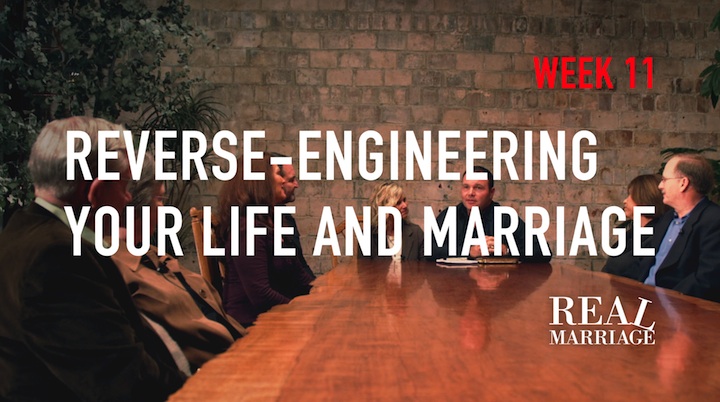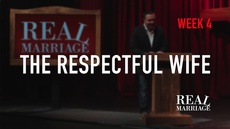
Can’t see the video? Download and install Flash to be able to view. Get Flash Here
The most important day of your marriage is the last day. What will that day look like? As you think about and plan for that, consider that you need Jesus, Jesus’ people, prayer and planning, as well as some flexibility and a sense of urgency. Pastor Mark interviews families whose marriage stories illustrate practically each of those biblical principles. We want to live purposefully, passionately, and presently, making the most of each day, just in case it’s the last day.
The most important day of your life and your marriage is, of course, the last day. And when it comes to marriage, so many couples are encouraged to invest so much time, energy, and money to get the perfect wedding. From the florist, to the caterer, to the photographer, to the attendants, to the attire, it is all about having a great first day. And it’s important and it’s a great gift to have a great first day, but the last day is the most important day.
There are lots of magazines on how to have a great first day, not on how to have a great last day. So many people have detailed plans for the first day, but they really don’t know what the plan is for the last day. What will the last day of your life look like? What will the last day of your marriage look like?
And Grace and I had an occurrence in our life where we were really thinking about our future. The truth is that we did love each other, and we did love Jesus, and life wasn’t bad, but it was getting complex: children, and work, and requirements that were really taking a lot of the time and energy that we really needed to be investing in one another.
And it sort of culminated on vacation. We were out of town, and I started thinking and praying about how Grace and I could make plans for the last day, how we could finish well, by the grace of God, hoping that God would give us many, many, many more years together. But the truth is you just don’t know. Today may be all you have, and you may not even have all of today.
And so that caused me to sit down and start thinking through how Grace and I could architect our life. And I took a legal pad and just started writing out questions for Grace. I knew that we had a long drive home from this vacation, maybe six hours in the car, and so I asked Grace, “Just take this time, and please answer these questions, and we can dialog about them as we’re driving, and we can get a vision for the last day. What do we want the last day of life together on this earth to look like?” And that allowed us to prayerfully begin planning and not just allowing life to go by us or be taken from us, but to be intentionally invested by us.
We’re going to talk about some of those things. We include those in chapter 11 of Real Marriage. That whole project that I gave Grace is in there for you to do as a couple, as well. And we’re going to introduce you, during this sermon, to some people who love each other and love Jesus, and we want to have their life help to illustrate a few biblical principles.
Number one: You’re going to need Jesus. You’re going to need Jesus to forgive your sin. You’re going to need Jesus to forgive their sin. You’re going to need Jesus to give you both the Holy Spirit to help you change from the inside out. You’re going to need Jesus to give you an example of how to love. You’re going to need Jesus to teach you how to forgive by forgiving you, Jesus teaching you how to love by loving you, Jesus teaching you how to persevere with one another, as he perseveres with you. The truth is the most important relationship is always the relationship with Jesus. And if both the husband and the wife are growing in their relationship with Jesus, that will grow their affection for and their devotion to one another.
So, the first question is do you know Jesus? Do you love Jesus? And are you, and—if you’re married—your spouse actively pursuing Jesus, repenting of sin, reading Scripture, praying, being in community?
What you’re going to hear from some of the couples we’ve interviewed, who have, by the grace of God, endured some very hard seasons, but had a very sweet and joyful life, even in the midst of trial, and trouble, and trauma, is that Jesus was at the center of their life, and Jesus was at the center of their marriage, and this allowed them to turn to him, to trust in him, and to become like him to others in seasons where oftentimes people frankly just don’t make it. They don’t make it individually, and they don’t make it maritally. And so number one, you’re going to need Jesus, and their stories will help to illustrate what that looks like really practically.
*
All right, Grace and I are here with the final Real Marriage sermon on the last day. Really excited to introduce everyone to some friends of ours. So, Pastor Bill, I’m going to let you introduce yourself and your family, and we’ll go around the table.
Pastor Bill: Okay. So, my name is Bill. I’m a pastor at Mars Hill Church, and this is my wife, Sue. And we’ve been married for almost four years. Our story is that I was married for thirty years and had a wife who passed away of cancer, and Sue was a single mom for twenty-one years, and so we figured that was enough time for her, and I didn’t like the alone thing, so we got married, yeah.
Thank you. He was not good alone. [Laughing]
Sue: That’s what I’ve heard.
I love Bill. He’s a friend of mine. But we could only sit at so many Mariner games and him just not be happy. So, we’re very glad that you came along. What was it like being a single mom for twenty-one years, and then here’s Bill?
Sue: It was quite an adjustment, because when you’re single, there’s not anyone else in your life to be kind of doing this dance with, that marriage is. And so I think we had a real adjustment time. But I guess I didn’t realize—I mean, he makes my life so full. And what did I do when I was single? I didn’t really remember being really lonely, but now I can’t imagine life without him.
Pastor Bill: That’s good.
Yay Bill! Don and Marcia, you are, as far as I know, the longest married Mars Hill couple.
Don: Yes, married fifty-five years, and enjoyed most of the time.
And how many children and grandchildren today?
Don: We have four boys in California and a daughter lives up here in Edgewood, and we’ve got twelve grandchildren. We haven’t got any great-grandchildren yet. I don’t know if that’ll happen or not.
Marcia: I was drawn to the man of strength that he was, but he was so gentle. And the very day I decided never to see him again, he decided—no, the other way around. The day he made the decision never to see me again—because he knew I was stringing him along—I was washing clothes, and there was a light bulb up there, and it was like God said, “You’re called to marry that man.” And he made up his mind not to see me again, and four days later I called him, and I said, “You call every night. What happened?” He said, “I got a date.” And he’s been worth it. He’s really a godly man.
Don: Yeah, I’m extra quiet, and she keeps the conversation going, which I cherish, really, when you get in company, you have somebody that carries the conversation through.
Marcia: It’s been a privilege to be married to him. He’s put up with a great deal, and he’s really brought my soul to know the Lord in a very deep way. I’m extremely grateful to him.
Don: I’m grateful to her, too. She keeps me in line, yeah.
You guys are very cute.
Pastor Tim: Hi, I’m Tim, and this is my wife, Patty. We’ve been married almost thirty-nine years now. We were high school sweethearts, and we still feel that way. We’ve been blessed with a daughter and a son, and our daughter is married. We have two grandsons, nine and six, and we currently serve at West Seattle, soon to be Downtown. We have so many things that we do together. We have a tandem bicycle. We have a tandem kayak. We go rollerblading. And so I just like to be with her. Even at the end of the day, when I come home, I’m so excited just to be able to be with her. She makes life fun. She introduced me to Jesus, and so her authentic faith, and her walk, and testimony really caused me to take Christianity seriously.
Patty: Oh my goodness. The minute he became a believer, he just took off, and he challenged me in so many ways that I went, “Oh, wait, give me a few minutes. I’ll look that up,” you know. And so he just was so, just hungry for the Lord, he made me hungrier for the Lord. And I think that, if anything, and the key of our marriage in thirty-nine years, is that we love Jesus, and we put him in our marriage, at the top of our marriage, and everything else was just by his grace.
And our dear friend, Miss Maggie.
Maggie: My name is Maggie Bolliger. I was married for four years and widowed twelve years ago now. I have a fifteen-year-old son. I was born in Seattle and raised as a pagan here in the Seattle culture.
Really? There are pagans in Seattle?
Maggie: There are, and I was one of them. And I went to school here and ended up going to college in Iowa. I knew I would travel, so I ended up studying comparative religion, so that I would know the religions that I met with, as I traveled the world. And I did indeed travel the world. I’ve been to twenty-five different countries for one reason or another, never for business, always just footing around. I spent one two-year time circling the globe, and that was not a plan, but, you know, took it as it went, enjoyed it. And so then I was working here in Seattle, and my mom called me over to her house, because there was a young man there doing some electrical work on our house, and he had been asking about—he saw my picture on the mantle and was asking about me. So, next time he came over, she made sure I came over, too, and met my husband. And we dated off and on, actually, for six months.
Off and on? Not even just a straight six months?
Maggie: No, no, no. Actually, some other relationships in the middle of that six, intense six months. My life has been very condensed, which leaves no room for thinking, which actually works out great for my personality. If I can just keep on going and keep on running, that’s great, not too much time to think. And then I got pregnant, and so we thought the next best thing would be then to get married. And so we did. We got pregnant, got married. I quit my job. He decided to keep me home, at least for the first year, which was great. We bought a house, and within the—let’s see, that was in the first year. And then three years into the marriage, my sister and her husband moved from their little house in Bellingham in the woods, in with us, because they wanted to move back to the city. So, we were like, “Oh, come live with me. I’m home. My sister’s home. It’ll be one big party.” So, we were enjoying that, decided to buy a bigger house. Found a bigger house, and through that process in April of ‘99, I became a Christian, and three weeks later, he came home with a diagnosis of a mass in his chest. We didn’t know—
Was he a Christian at that time?
Maggie: He was a Christian. He was raised Lutheran.
How long were you married together as Christians?
Maggie: One year.
One year? So, just the final year of your life together, you were Christians.
Maggie: Not much matters at the end of your life. And, you know, it becomes very, very elementary of what’s important.
Not only do you need Jesus for your life and your marriage, if you are married, or in the grace of God become married, you need Jesus’ people. You need to have community and wise counsel. Proverbs 15:22 says it this way: “Without counsel plans fail, but with many advisers they succeed.” So, you absolutely need Jesus, and then you need Jesus’ people to help you learn the Scriptures, and repent of sin, and see your own blind spots, and to, in every way, encourage you toward godliness, and love, and Christlikeness.
What you’re going to hear very practically, from some of the stories of our friends, are how they did avail themselves to teaching. They were willing to learn. They were willing to change their mind. They were willing to redirect their life course from biblical study, to sermons, to godly counsel, to good friends, to wise authors, including listening to their spouse. And sometimes God will give us wisdom in our spouse, but we lack the humility to receive God’s wisdom through them.
As you’re going to hear from these people’s stories, there is no possibility of maturing and growing individually and maritally, apart from wise counsel. And so things like picking your church, picking your friends, picking your counselors, and picking your Community Group is exceedingly important.
One of the reasons Grace and I ended the book Real Marriage with chapter 11 on the last day was to help you start thinking about the very practical matters like who will give us counsel? Which community will we be in? And who will we invite to speak into our life? And the examples you hear from some of our friends are really good practical indicators of what that might look like.
*
Maggie: When Andy died, we loved each other. We knew we’d see each other in heaven. He supplied enough money for me, and he also put me in the environment and around people that would support us. So, he said to Brandal, “Take care of her. Take care of him. Raise my son.”
Yeah, your brother-in-law.
Maggie: Yeah, my brother-in-law.
Who is a very wonderful man.
Maggie: Yeah. And he does. He’s taken that to heart. And then other men have stepped in and been different things to him, and it’s been a matter for me to let go. I mean, I would raise a fine girl, but not a boy. And so a matter of letting these men lead him and making sure they’re godly men. And I have about six couples that speak into my life, that I now know to listen to.
Pastor Bill, if you would be willing, tell us about, kind of—you’ve got, in some ways, two lives—not the other one where you’re a ninja or a secret assassin or something—but you had a marriage, and children, and a life, and then your wife passed, and then God’s given you a lovely new wife and a new chapter of your life, and so you’ve had two major chapters to your life.
Pastor Bill: Yeah, I mean, we, in a lot of ways had the family that you kind of put on a poster and say, “That’s what the target is,” you know? And—
Two boys, two girls.
Pastor Bill: Yeah, girls on each end, boys in the middle. Jeanne was a great Christian woman, who was a great ministry partner, and mentored a lot of high school girls. We were youth pastors for sixteen years, and so a lot of mornings before school, she’d run around in, actually, your guys’ neighborhood, picking up girls, and then dropping them off at Highline High School. And all of a sudden, in the midst of doing what God wants, we get what no one wants. Jeanne had a lot of stomach pain, went to the doctor, and was diagnosed with stage three ovarian cancer.
And how old was she at that time?
Pastor Bill: I’m guessing she was, like, forty-six.
And she was healthy, good shape.
Pastor Bill: Yeah, yeah.
You know, very much alive and vibrant.
Pastor Bill: Yeah, we went through that up and down period of remission for eighteen months, and then it being back, and trying all the different kinds of chemo that were available to us. I mean, it was almost like the first year we had relocated back to Seattle to plant a church is when she gets diagnosed, you know? So, I mean, we had some equity from a house sale. And, I mean, I was ready to take—looking back on it, I was ready to take the coward’s way out and say, “Okay, I’ve got enough money to live for a year. Let’s just go for it.” And she said, “If we have a year left, why wouldn’t we plant a church?” Okay.
And that’s now Mars Hill West Seattle.
Pastor Bill: Yeah, yeah.
I mean, that’s how you joined the team. That’s how we got the blessing of picking you up.
Pastor Bill: Yeah.
And so how long did she have cancer? And I know in there, there was, “Oh, it looks better. It looks worse.” There’s that whole rollercoaster of hope, and then devastating news, and hope, and devastating news.
Pastor Bill: Yeah, she fought it about eight years, yeah.
Eight years. What was it like? I was there with you at your wife’s funeral.
Pastor Bill: Yeah.
I mean, what’s that day like? I mean, every married couple—either the husband or the wife—is going to have that day, where, you know, the life that God has given you on earth has come to the end, and there’s that finality about it. What was that day like for you to bury your wife?
Pastor Bill: I think it was really off-balance, because I had gotten too much identity from being a husband. You know, I wasn’t solidly locked into, “I am bulletproof in Jesus.” You know what I mean? Jesus basically talks about, at the end of his Sermon on the Mount, that a wise man and a foolish man are going to build their house, and the rains are going to come, and the floods are going to come, and the wind’s going to come, and the foolish man’s house will collapse, and the wise man’s house will stand, because it’s built on Jesus. And as Americans, I think we hear, “If you build your house on Jesus, the rains don’t come, and the floods don’t come,” you know, rather than the idea that your house stands through those. He doesn’t say, “I’ll make your life crisis-free.” He says, “I’ll make your life crisis-proof.” And I really wasn’t there. I was getting as much identity from being a husband as I was from being a Christ follower. And so when she died, I didn’t know who I was. I had probably a month of just real disequilibrium. You know, I mean, I’m grateful for the friends who would say, “Do you want me to come over?” I’d go, “No,” and they’d go, “Okay, I’ll be there in an hour,” you know? And just imposed themselves into my life, and brought rails that I would’ve run off of, you know? So, community rescued me, yeah.
Essential to your life and your marriage is prayer, and prayer is talking to God the Father, through God the Son, by the power of God the Holy Spirit, and it is also listening to God, and prayer is the rhythm of conversation with God, who is our Savior, and Father, and friend. And one of the things that will help change your heart and help you to build your relationship, particularly with a spouse, is prayer. It’s one of the most intimate things you can do, and it invites Jesus into the middle of the friendship and the relationship.
Proverbs talks about this very clearly. Proverbs 16:3, speaking about wisdom, says, “Commit your work to the Lord, and your plans will be established.” He’s talking here about praying and planning; praying before you make your plans, and then praying through your plans, and then praying that God would help you to execute your plans, and that God would bless your plans, as you walk in them.
And so I would ask you, are you one of those people who you prayerfully direct the course of your life and put your plan together? “Here’s what I want for the last day. Here’s who I want to be, what I want to know, what I want to do, how I want to change, who I want to help, where I want to serve.” Do you pray that God would just bless your plan, or do you pray to the Lord that he would help to give you your plan, and then he would bring to fruition those plans and principles that he gives for you?
It’s important that you be praying for your spouse—this is even for those of you who are single—to be praying with your spouse, when you are married, and always inviting Jesus in. And what you’re going to hear from some of the couples is some really beautiful examples of what prayer looks like in a marriage, including a couple that’s been married fifty-five years and repeatedly, throughout the course of the day, will just stop and pray together. And they have seen the power of prayer over the course of fifty-five years, as God has answered their prayers, and it’s why they continue to invite him into everything.
*
Marcia: We’ve always—when we were first married—you talked about a plan. I could see he was very quiet, so after much prayer, I decided he would do all the praying at night, when we cuddled in bed, for probably the first fifteen years or twenty years, and then we started both of us praying in bed, and now that we’re retired, we tell the children that’s probably our main ministry is prayer for them. “So, call us; we’ll pray.” And we often, four or five times a day—
Don: Yeah, pray for different people.
Marcia: We set chairs side-by-side, and we pray together. Prayer is where the battle is.
Don: Yeah.
Marcia: Prayer is where the battle is. We have fought constantly through the years and we scrap fair, sometimes, sometimes.
Grace: How did you work through when you fought? What were some of the ways that you learned to communicate better?
Marcia: This has been a precious time because we look more to the future than the back and so we asked our sons a few questions. Our fourth son, Paul, really—he’s quiet like Don, very godly man, and he drives home for two hours. Every Tuesday we hear from him, and he said, “You would fight,” and he said, “I knew it would end every time in three to four hours, and you would repent.” And he said it was a good demonstration of what it ought to be. And I always won verbally, and I always won intellectually, and he very quietly at the end, one time he stood there very proudly and he said, “You know, it’s the same old crap. You’re not listening.” I figured I should give up and he was winning. See, you have to realize that when you marry a man, he has shortcomings and I have shortcomings. You’re both horrible sinners, and that’s the good part of marriage is, after fifty-five years, there’s no doubt you’re horrible sinners, and the heart is desperately wicked. But he taught me not to fight. I’m much better at it, being quiet, and to yield. You know, your body, a woman yields quickly when they’re married, but a woman takes fifty-five years, or fifty years to learn to yield your spirit to a man. And I think it goes way back to the Garden: We simply don’t trust Adam. And I asked one of my dearest friends who I’ve met with just recently, and has been attending Mars Hill off and on. She’s had four marriages, and I said to her, “What would you like to have heard when you made your four choices? She said, “I would’ve liked more to have trusted Jesus.” She said, “I did not trust Jesus.” And I said to her, “How do we teach that? How do we communicate that?” And our focus has been to be in the Scriptures, read the Bible through every year, and discuss it.
Grace: What’s one of your favorite memories together?
Marcia: Our favorite memory together . . . making love in the dark, out in the open. We had an agreement with our boys, ‘cause they were older, that they were never to come home on Friday afternoon. We didn’t have a lot of money—
I totally know where this is going.
Don: And we went to Hawaii on our twenty-fifth anniversary. I thought that was a real highlight. I liked that. I had to fly over there, which was terrible, then I got on a helicopter, and that was worse yet, but we really enjoyed that.
Marcia: I know, we watched the turtles go out in the sea. It was—and marriage is a picture of how Christ feels about his people and his bride. His invisible believers on the Earth. He really loves us and pursues us and fights fair with us.
Don: Yeah.
Marcia: He does.
As you’re thinking about the last day, the last day of your life, and—if you’re married or become married—that last day with your spouse, you need to have some hopes, and goals, and dreams, and vision, some prophetic imagination of what the future could be like in the grace of God and what your legacy could be in the grace of God.
For example, one of the things I’ve asked the Lord repeatedly is that if Grace and I were not to die together, that she would die before me, and that I would outlive her. I want to make sure that she’s provided for, and protected, and looked after, and cared for every day of her life, since she met me, and that that would be done by me. It’s good to have some dreams, some goals, some hopes, some vision, and really be leaning into the future for that last day on earth before you stand before the Lord Jesus and every day thereafter.
But the truth is it doesn’t matter how well we plan and prepare, and sometimes even specifically how we pray. Things don’t go according to what we were anticipating or expecting. And so in addition to having prayer, and preparation, and planning, you also need to have some flexibility. Proverbs 16:9 says it this way: “The heart of a man plans his way, but the Lord establishes his steps,” meaning you may have a great plan for your life and your future—
Some of you may say, “Well, we’re going to get married, and then we’re going to have kids, and we’re going to buy a house,” or, “We’re going to be in this vocation,” or, “We’re going to serve in this ministry,” or, “We’re going to live in this city,” or, “We’re going to be together for this many decades.”
But we don’t know. We just don’t know what the future holds. Will one of us get sick or both of us? Will tragedy come upon us that we weren’t anticipating? Will one of us die long before we were expecting and be preparing the funeral and a future that is devoid of the person that was written into every page of every day that we had scripted for the rest of our life?
What is revealed in those moments, truly, is a relationship with Jesus. Do we believe that he will be enough, if our spouse is gone? Do we believe that he is still good, even when things are hard? Do we trust that he will, in every way, get us through whatever season we find ourselves in? Not that it’ll be easy or pain free, but that it will be for Jesus’ glory and our good.
I think sometimes, with couples—and I know Grace and I have been guilty of this—you just assume that you’re going to have a long time. If you’re fighting, “We’ve got time to work it out.” If we haven’t dealt with past issues, there’s plenty of time to deal with that. The assumption is there’ll always be more time. “We’ll get there eventually. We’ll work on our friendship in a few years. When the kids are grown, then we’ll really work on our spiritual life and be involved in church, and Community Group, and Bible reading, and prayer. But right now, you know, we’re trying to start our family. We’re trying to start our company. We’re trying to make sure that the kids are involved in all their activities.”
So much of life takes so much of life that we really want to encourage you to have a sense of urgency. The truth is we just don’t know. We don’t know if we have another minute, let alone another day, another week, another month, another year, another decade. And we don’t want to live foolishly and shortsightedly, but we also want to live purposefully, and passionately, and presently, making the most of every day, just in case it’s the last day.
Again, some of our friends that are willing to share that with us give us some tremendous insights, that our hope would be would help to open your heart toward the possibility of you not having as much time as you thought and having a sense of urgency that you ought.
*
Pastor Bill: I brought my four kids together at our dining room table, before I met Sue, and I took off my wedding ring from Jeanne and put it on the table and said, “I’m going to start dating.” And they all go, “Oh, my gosh.” [Laughing] And I really didn’t know what I was doing at all. So, like, I got on eHarmony. And, you know, they have a picture and a profile. So, I just started cutting and pasting. And I made a PowerPoint presentation and showed my kids. [Laughing]
That’s fantastic. So, how did you guys meet?
Pastor Bill: Same thing, on eHarmony.
On eHarmony?
Pastor Bill: Because we started asking questions, and then we found out that she’d gone to a church that I’d been the youth pastor at, you know, twenty years ago, and that I’d had cousins of hers in my youth group. And so, you know, we had references.
How awkward was it? You’re dating, and now your kids are married, giving you relationship advice.
Pastor Bill: It was, it was— I mean, it was weird. And for the most part, they weren’t real happy. You know what I mean? And most of them were guarding hard the memory of Jeanne.
Yeah, and your kids are probably wanting to protect you.
Sue: Well, and that’s the thing I didn’t understand until we were married, really. My son, you know, he was—both my sons—the oldest one was six, and the younger was eighteen months when their dad left, and I didn’t realize that the oldest one had really taken on this position of—
Your protector.
Sue: Of my protector. And he had never stepped up and never said that, but when we were going to get married, he just really verbalized that, that he wanted to know who was this man that was going to be in my life now, and really stepped into that, that he was very concerned for me, and that he had carried that load all of those years and had never really told me that he’d been, you know, in that place in his heart.
Yeah.
Pastor Bill: So, everybody was doing kind of a tentative dance. And, you know, we looked at our kids, both of them, really, and said, you know, “Bill doesn’t have to be your dad. Sue doesn’t have to be your mom. But we want to be husband and wife.” And Candice, my daughter-in-law, was really the one that just kind of weighed in, and she goes, “Okay, I love Jeanne, and you’ll never take her place, but my kids need a grandma, so you’re in.” You know? And everybody just kind of jumped into, “You can be Grandma Sue,” right away, you know?
That’s a great place to be.
Pastor Bill: Yeah.
Grace: Those are cute boys too.
They really are.
Patty: We’ve had some tough chapters with our son—another whole long story—but at three years old he was diagnosed with leukemia. And, I mean, our whole life changed. God was so faithful in that time. When I would break and literally just cry and just cry upon, you know, to the Lord, [Tim] was really strong and would just hug me. And then Tim has not cried much in our marriage, but those were the times he cried. And when he would break, the Lord would just give me that strength. So, it was never together that we were down. It was always one or the other that the Lord was using to just keep us tight together. We saw the Lord working in all these families, and the miracle that our son— The doctor wouldn’t even let me—at first, I’d go visit other gals that had leukemia kids. And Tim—our son’s whole situation was so not the norm, that he says, “You know what? You can’t go and talk to these people now, because he’s not the norm.” We had all the elders anoint him with oil in the hospital, and the presence of the Lord, we could just feel it, and that day his counts went up. They never dropped again. So, we believe—
He’s healthy today?
Patty: Oh, yeah.
How many years ago was that?
Pastor Tim: Twenty-eight years this Mother’s Day.
Patty: Yeah, but he was healed that night, and it was just, even the doctors and the nurses said, “Do they need the chaplain?” They said, “Oh, no, I don’t think so. They’ve got five pastors in there right now.” You know, so big trial, but amazing, amazing grace that God gave us of strength one day at a time. But, boy, the lives that, through that experience, were touched by just trusting the Lord and giving glory to Jesus for healing him was unbelievable. Just remembering how special it was to sit around a table together as a family, we really made that a priority.
Pastor Tim: Yeah, and I think that contributed to the idea about finishing well: you just have today, because we didn’t know. We realized that children really are a gift from God and that anything that you have, the life that we have is a gift, because it can be just, can just be gone. And so that really taught us that and really, I think it really renewed and strengthened us. We really had a great marriage to that point.
Patty: It was strong.
Pastor Tim: Yeah, and it really made us that much stronger and really re-emphasized the gift that we have of today.
For the couples that are going to hear this, and maybe they’re not as reconciled as they should be, or they’re so busy making their plans and working on their future that they’re not really enjoying the present—I mean, from your perspective, what advice, what counsel would you give, as somebody who only had a few years married and only had one year married as a Christian?
Maggie: Yeah. That most likely, life is very long, and you get lots of time, and what’s important today is not important next year. And so just constantly pulling back and looking at that big picture, and then at the same time, knowing every day is precious. You get angry, or you go to sleep angry, or you leave angry. And I know, in the back of my mind, it’s always, “Well, they could be dead. Make up, because you don’t want to leave it that way.” He died in the house. Everyone was there. We all got to say goodbye and I love you. And that, to me, was priceless. I didn’t know all year when he would die, whether I was going to be there, and I’m just grateful that we all got to be there.
I’m going to ask a question, and everybody could take a turn. We’ll make this just one sentence. Okay, so, best counsel regarding marriage you’ve ever gotten—one sentence. Anything come to mind? Your whole life, anything you’ve heard, read, somebody said, I preached in a sermon, perhaps. You say, “That was the best advice or the advice that comes to mind.” One sentence, what would that be?
Pastor Tim: Don’t go to bed angry. Keep short accounts.
Ephesians 4, yeah.
Maggie: Keep your eyes on Jesus, not each other.
Don: Be quick to forgive and to take correction, and hope for the best.
Anybody else?
Pastor Bill: The thing I learned was if I did everything that a biblical husband did, I got a 50 percent. And I thought I was a good husband with Jeanne, and I did biblical husband, and I knew Jeanne. I was married when I was twenty-one. We were married for thirty years. So, I just imported all that to Sue, and I was getting a 50. And I’m going, like, “What’s the problem here?” But it’s like the biblical—
She’s a different girl.
Pastor Bill: Yeah, so the biblical husband is like the alphabet, and your spouse is your signature, you know?
Yeah. You were going to say?
Patty: I was going to say, for the women, I think what was told to me years ago is to make your home a haven for your husband. Tim has had very strong, high-stress jobs all his life, through the Coast Guard, all through his careers, and his home was a place to rest, and don’t make it crazy, chaotic. Even with kids, make it a wonderful place to come home to.
Marcia: What Don said to me, when we had our first serious fight—we must have been married about a month a half—and he simply said, “You made a vow, and you’d better keep it.” And it went right to the depth of my soul, and I never debated it ever again. “You made a vow. You’d better keep it.”
Don: Yeah, that’s true. I have a word of advice for young people: to not go dating by yourself with somebody until you’re financially independent.
Yeah, especially for the men, yeah.
Don: We found that worked with our children.
Absolutely.
Pastor Tim: And I know when we read Proverbs 31 that every guy wants that. And the point of it is, is that we’re responsible for our wife being able to bloom. That’s part of this “what does it mean to be a spiritual leader of your family” is help your wife bloom to become that Proverbs 31. It’s not wishing and hoping for something else, but I have personal responsibility. I think my favorite pastor said something like that early in the series.
Yeah, I mean it’s true, though, if you look at it—
Grace: Your wife is flourishing.
Yeah, you’re the gardener. As a husband, you need to be the gardener, and you can’t just say, “Man, you know, I wish that garden looked different.” Like, well, then the gardener needs to get involved, you know?
Pastor Tim: And that’s right. I’m the gardener and accepting that responsibility, and being able to allow her to bloom.
Yeah, she’s happy, which is a good sign.
Pastor Tim: Momma’s happy, we’re all happy.
Patty: That’s another saying.
How about the one thing you’re most glad about in your marriage, the one thing you thank God for the most, the biggest joy, the biggest blessing, the one thing that is at the top of the list of “Thank you, Lord, for that.”
Sue: I guess I could respond to that. I feel like there are many times that Bill could keep up with an argument for wanting to be right, and he will let it go. And I see it as being very sacrificial, and that is love, and I see him reflecting Jesus in what he doesn’t have to do, and then it makes me want to reflect Jesus to him, and that when those opportunities come, and I want to be bullheaded, and I want to have—I want to win—that that’s my opportunity that I get to give him a glimpse of Jesus, and I’m really thankful for that, that I get to see Jesus through him.
Pastor Bill: Yeah.
Yeah, and sometimes you can win an argument and lose a spouse. It’s much better to win a spouse, yeah. Anybody else, you say, “Boy, I’m so thankful for that”?
Marcia: My deepest gratefulness is God is first in his life.
You know he loves Jesus?
Marcia: God is first, yes. God is first.
What does that do for a wife emotionally, knowing you don’t have to be God to him, you just get to be wife?
Marcia: Well, to me, it’s been that he’s— I asked him the other morning, I woke up—a man of few words, remember—I said, “What do you like best about me?” He said, “You’re there.” And right away then I go to Christ, and I say, “What did he mean?” And he said, “Well, that’s the way it is, where I feel that there’s a church. It’s mine. The church is mine. It’s there.” And that’s the way it is. He’s there for me. He loves me like a bride. Even though I’m old and gray, he still loves me like a bride.
Don: And she goes to the doctor with me, and we’re together a lot, and it’d be a real missing if she wasn’t there. And she’s a nurse, too, and she knows how to take care of minor illnesses.
Well, we thoroughly enjoy just hearing the grace of God in your life. It’s a huge encouragement for so many who didn’t come from intact families, who didn’t have Christian parents, or are brand-new Christians, or are single and even a little concerned about getting married because they don’t have a lot of good hope or examples. I mean, I know even for all of us, even those that have been married a while, it’s an encouragement.
So, if you’d be willing, Don, I’d love to just give you the final word in the whole sermon series. And if you would be willing, just to close our time in prayer and to pray for those who would hear this and the couples that we might be able to serve from our conversation. I’d really, really appreciate that, if you could just close our time in prayer.
Don: Father in heaven, we come before you so grateful and thankful for having a Savior like our Savior Jesus, and we just pray that these conversations here and all around the table this evening will enlighten, encourage, and be a blessing to those people that hear it. We just pray that you’ll cause it to really awaken what you would have them to be awakened to, whether it’s continuing in their marriage to continue on in strength and trust and love for each other, or that it’s people that are hurting because their marriage isn’t so good, and we just pray that all these things are put together, including this series that Mark is in now about marriage, pray that all these things together will work out for your honor and glory. We just praise and thank you. In Jesus’ name, amen.
Amen, amen.
Note: This transcript has been edited for readability.







